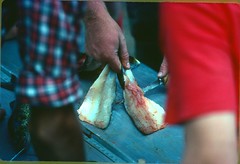Freshly minted literary awards fascinate me. They put flesh on the bones of an idea, pair an abstract notion with an extant work of art. That’s why I was quick to scoop up Nick Cutter’s The Troop, the first book to win the James Herbert Award. Now Herbert penned horror novels, so I wasn’t surprised to see a blurb from Stephen King adorning the dust jacket. Nor did it shock me that combustible phrases such as "unspeakable torment," "far more frightening than any ghost story," and "a bioengineered nightmare" graced its inner flap. No, what caught me off-guard was Cutter’s intentionally oblique biography: "Nick Cutter is a pseudonym for an acclaimed author of novels and short stories. He lives in Canada." Why in the world would an author take such obvious steps to hide his identity?
Then I started the book and understood exactly why.
The plot of The Troop is textbook high-concept. Five scouts and their scoutmaster are about to embark on their last solo-scouting jaunt on Falstaff Island, a tiny place near better-known Prince Edward Island. The quintet of kids shakes out into the expected archetypes. The nerd. The jock. The angry one. The normal one. The one who's a little off. The situation itself, though, soon goes sideways when a strange man arrives on the island in the middle of the right. Rope-thin and sweat-sheened, the man simply looks wrong. Plus, he's hungry, so very hungry—and it's catching.
You don't need an extensive education in horror to know that the hungry man's illness will spread in horrible ways. In fact, Cutter lets you know that from the get-go, interspersing chapters with sensational news articles and chilling court transcripts. He makes great use of Hitchcock's famous bomb theory, creating nigh-unbearable tension by cluing in readers to future plot points without explaining how the characters will wind up there. I won't spoil the details, but understand that grisly body horror abounds. Flesh wastes away within hours of infection. Minds shatter under the strain of paranoia with violent results. One patient starts losing his teeth as his gum recede, "yet they remained connected by ... braces, gray teeth linked like charms on a gruesome bracelet, clicking and clacking in the dark vault of his mouth." Yeah, this isn’t the sort of content you want to be discussing at the next PTA meeting.
However, some of this terribleness is mitigated by Cutter making it clear that more is at work here than just the machinations of an unfeeling universe. Man’s megalomania, greed, psychosis, and simple evil carry the lion’s share of the blame. In that sense, it’s profoundly moral. No wonder multiple allusions to William Golding's Lord of the Flies appear. Cutter also knows how to write a grab-you-by-the-throat plot and liberally sprinkles the proceedings with metaphors (“Fear stole into Kent's heart like a safecracker”) and vivid descriptions (“Coin-bright wedges of light ... shafted through apertures in the roof”). The Troop is equal parts terrible and terrifying. It also happens to be a great read.
(Picture: CC 2006 by Bruce Tuten)
Thursday, May 7, 2015
Subscribe to:
Post Comments (Atom)



No comments:
Post a Comment